You are here
New Releases
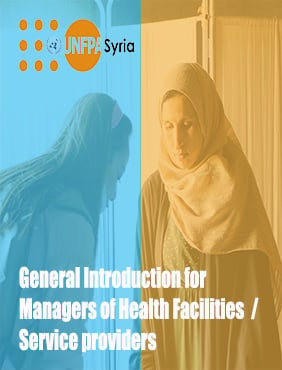
Service Providers & Health Managers Information Package
Welcome to all new UNFPA partner health care providers, and managers, supporting health care services!
As you know UNFPA is focused on sexual and reproductive health (SRH), and particularly in the reproductive health minimum initial service package (MISP). For these health services there are globally guided packages of health care that we would like you to familiarize yourself with to be sure the quality of services is at its best! Luckily for us there is a lot of written material and videos on provision of quality SRH and in this document we hope to introduce you to it! The MISP package includes health response to sexual violence, prevention, diagnosis and treatment of STI, maternal and newborn health, and pregnancy prevention.
In this package, you will find links to more information on the above topics, some in Arabic but some we could only find in English. We suggest you pick one link every day and read through the document, or listen to the related video, in time you will complete that package. If you have questions or concerns please let us know! We think this is important for both health care providers and also for managers as it is important that managers understand what services are needed in their health clinics so they can ensure that the enabling environments and support needed for the health care providers are present. Lastly if you have suggestions on how we can support you to provide quality services please let us know!
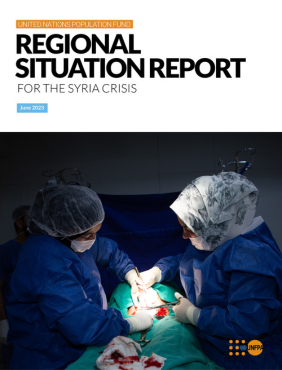
UNFPA Regional Situation Report For the Syria Crisis — June 2023
Halfway into 2023, Syrians and host communities throughout the region are living through one of the worst years of the crisis. People in need continue to face the escalating impact of a protracted conflict, further complicated by a collapsing economy, climate-related challenges, and chronic and new emergencies, including the massive earthquake that struck Türkiye and north-west Syria in February 2023.
The crisis region, which spans the Whole of Syria, Türkiye, Lebanon, Jordan, Iraq, and Egypt, continues to face a multitude of challenges, particularly in light of widespread and ongoing humanitarian challenges in multiple countries, far-reaching inflation and economic recession, as well as the wider impacts of the other crises in the region and beyond. More than twelve years into this protracted crisis, people continue to endure the cumulative effects of years of instability,
the risks of which are even higher now due to extended disruption in community networks and the rule of law.
The Regional Situation Report for the Syria Crisis offers a bird’s eye view of UNFPA’s operations within the context of the Syria crisis. The report is prepared by the UNFPA Regional Humanitarian Hub for Syria and the Arab States (The Hub) in Amman, and spans operations led by UNFPA offices in Türkiye, Lebanon, Jordan, Iraq, and Egypt, in addition to operations led inside Syria, both from Damascus and cross-border via Türkiye.
In addition to providing aggregated quantitative results for each country involved in UNFPA’s regional Syria response, this report also brings stories from the field that highlight the plight of communities inside Syria and in host countries, underscoring the positive impact of the response delivered by UNFPA in the areas of sexual and reproductive health, gender-based violence, youth engagement, and others.
The quantitative data presented in this report is cumulative, covering achievements made in 2023 as of the reporting month.

UNFPA Regional Situation Report for the Syria Crisis — May 2023
As of May 2023, Syrians and host communities throughout the region are living through one of the worst years of the crisis. People in need continue to face the escalating impact of a protracted conflict, further complicated by a collapsing economy, climate-related challenges, and chronic and new emergencies, including the massive earthquake that struck Türkiye and north-west Syria in February 2023.
The crisis region, which spans the Whole of Syria, Türkiye, Lebanon, Jordan, Iraq, and Egypt, continues to face a multitude of challenges, particularly in light of widespread and ongoing humanitarian challenges in multiple countries, far-reaching inflation and economic recession, as well as the wider impacts of the other crises in the region and beyond. More than twelve years into this protracted crisis, people continue to endure the cumulative effects of years of instability, the risks of which are even higher now due to
extended disruption in community networks and the rule of law.
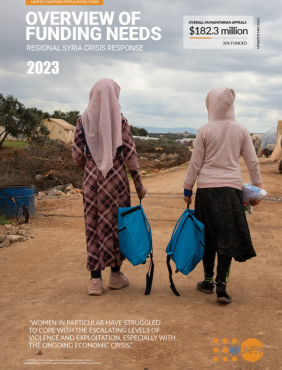
Overview of Funding Needs / Regional Syria Crisis Response 2023
This document provides an overview of the funds required for UNFPA's regional response to the Syria crisis in 2023.
UNFPA is appealing for a total of $182.3 million, which includes includes an appeal of $134.9 million to fund UNFPA’s regional Syria crisis response across the Whole of Syria, Türkiye, Lebanon, Jordan, Iraq, and Egypt, in addition to $33.6 million to fund its response to the February earthquakes in the Whole of Syria and Türkiye, $7.2 million to fund the Lebanon Emergency Response Plan, and $6.65 million to fund the Sudan Emergency Response Plan.
In light of the extensive humanitarian needs in 2023, compounded by economic deterioration and the devastating impact of the February earthquakes, women and girls throughout Syria and host communities are more reliant than ever on humanitarian assistance, making the consequences of underfunding both significant and far-reaching.
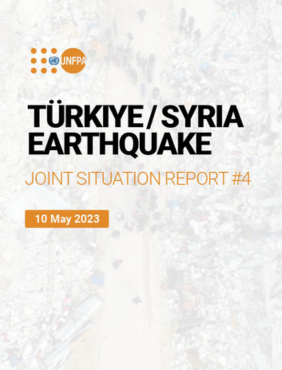
Türkiye-Syria Earthquake Joint Situation Report #4
In the early hours of 6 February 2023, multiple earthquakes, the strongest being of 7.7 magnitude, struck southern Türkiye and northern Syria, creating a disaster of colossal proportions. Following the initial quake, around 17,000 aftershocks occurred until March 13, highlighting the vulnerability of the region to future earthquakes and the severe risks facing communities.
In addition to leaving hundreds of thousands of people, mostly women and children, without access to shelter, food, water, heat, and health care, the emergency is further compounding the risks of gender-based violence. In Syria, close to nine million people have been affected by the devastating earthquakes. The damage is worse in the north-west, where more than 4.2 million people have been affected in Aleppo, and three million people have been affected in Idlib. More than 7,400 buildings have been completely or partially destroyed. In Türkiye, nearly 50,000 people were killed and tens of thousands more were injured due to the earthquakes, while over 216,000 people from affected areas have been relocated to other provinces, according to Türkiye’s Disaster and Emergency Management Authority (AFAD).
The catastrophic consequences of the earthquake have been exacerbated by the severe weather conditions that have affected north-west Syria and Türkiye in recent weeks. The heavy rain and floods that struck the region are having a serious humanitarian impact on people’s lives, health, and access to services, particularly those living in reception centres, camps, informal settlements, or on the street.
UNFPA has issued two appeals to fund its responses in Syria and Türkiye, with a combined total ask of $44.5 million. UNFPA calls on the international community to focus on leaving no one behind and to support humanitarian and recovery efforts on building resilient sexual and reproductive health (SRH) services and prevention and response mechanisms for all forms of gender-based violence (GBV), including child and forced marriage.

State of world population report 2023 Highlights - 8 Billion Lives, INFINITE POSSIBILITIES
In November 2022, the world’s population surpassed 8 billion people. Our human family is now larger than ever before. Collectively, we live longer and enjoy healthier lives than at any other point in human history. Yet ours is also a world of anxiety and uncertainty. Challenges like climate change, economic upheaval, confl ict and COVID-19 have brought us to a crossroads, where the threat of a worse future for humanity feels just as possible as the promise of a better one.
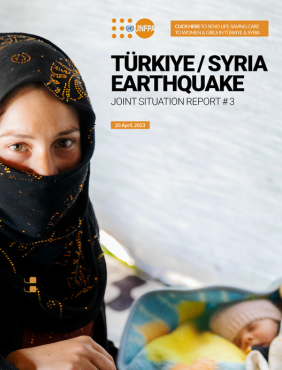
Türkiye-Syria Earthquake Joint Situation Report #3
In the early hours of 6 February 2023, multiple earthquakes, the strongest being of 7.7 magnitude, struck southern Türkiye and northern Syria, creating a disaster of colossal proportions. Following the initial quake, around 17,000 aftershocks occurred until March 13, highlighting the vulnerability of the region to future earthquakes and the severe risks facing communities.
In addition to leaving hundreds of thousands of people, mostly women and children, without access to shelter, food, water, heat, and health care, the emergency is further compounding the risks of gender-based violence. In Syria, close to nine million people have been affected by the devastating earthquakes. The damage is worse in the north-west, where more than 4.2 million people have been affected in Aleppo, and three million people have been affected in Idlib. More than 7,400 buildings have been completely or partially destroyed. In Türkiye, nearly 50,000 people were killed and tens of thousands more were injured due to the earthquakes, while over 216,000 people from affected areas have been relocated to other provinces, according to Türkiye’s Disaster and Emergency Management Authority (AFAD).
The catastrophic consequences of the earthquake have been exacerbated by the severe weather conditions that have affected north-west Syria and Türkiye in recent weeks. The heavy rain and floods that struck the region are having a serious humanitarian impact on people’s lives, health, and access to services, particularly those living in reception centres, camps, informal settlements, or on the street.
UNFPA has issued two appeals to fund its responses in Syria and Türkiye, with a combined total ask of $44.5 million.
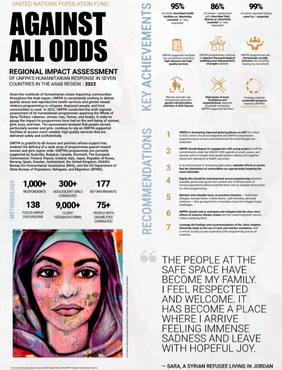
Against All Odds: Impact Assessment of UNFPA’s Humanitarian Response in the Arab Region
Given the multitude of humanitarian crises impacting communities throughout the Arab region, UNFPA is consistently working to deliver quality sexual and reproductive health services and gender-based violence programming to refugees, displaced people, and host communities in need.
In 2022, UNFPA conducted the sixth regional assessment of its humanitarian programmes spanning the Syria, Türkiye, Lebanon, Jordan, Iraq, Yemen, and Sudan, in order to gauge the impact its programmes have had on the well-being of women, girls, boys, and men. The assessment revealed that people served, particularly women and girls, continue to rely on UNFPA-supported facilities to access much-needed, high quality services that are delivered safely and confidentially. This fact summarises the methodology and key findings of the assessment, in addition to a series of recommendations that emerged from those findings.
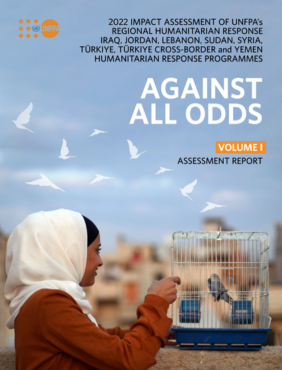
AGAINST ALL ODDS
This assessment report is the sixth regional external assessment of UNFPA humanitarian programming in the Syrian and Arab States region (incorporating responses to the Syria crisis within Türkiye and cross-border from Türkiye to Syria and UNFPA humanitarian responses in Sudan and Yemen) to report on the impact on women, girls, boys, and men that UNFPA programming has had, across sexual and reproductive health (SRH), gender-based violence (GBV) and youth programmes. This 2022 assessment builds upon the previous annual impact assessments from 2016 onwards, tracking the evolution of programming through the evolution of the Syrian crisis, the COVID-19 pandemic, and for 2022, incorporation of UNFPA humanitarian response work in the countries of Sudan and Yemen.
The findings of the assessment are intended to inform UNFPA programmes, with the overall aim of enhancing the services that UNFPA provides. These findings will also be considered when designing new programmes or amending existing programmes. This report also informs the donor community to gain a better understanding of UNFPA’s operations in both the Syria regional response and the wider Arab States region.
The 2022 Impact Assessment builds on the established methodology of the 2021 Impact Assessment which rationalised and systematised the different tools and questions previously used to conduct research among three types of service delivery points (SDPs) with three primary research tools: Client Feedback Forms (CFFs) among attendees at services, Focus Group Discussions (FGDs) among attendees at services and Key Informant Interviews (KII) with institutional stakeholders – partners, service providers, UNFPA staff. The table below summarises the number of each type of research tool applied.
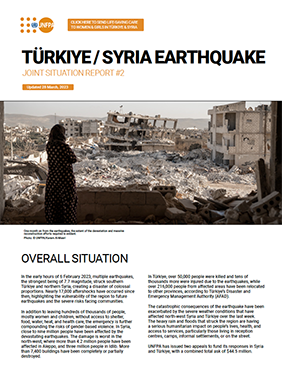
Türkiye / Syria Earthquake Joint Situation Report #2
In the early hours of 6 February 2023, multiple earthquakes, the strongest being of 7.7 magnitude, struck southern Türkiye and northern Syria, creating a disaster of colossal proportions. Nearly 17,000 aftershocks have occurred since then, highlighting the vulnerability of the region to future earthquakes and the severe risks facing communities.
In addition to leaving hundreds of thousands of people, mostly women and children, without access to shelter, food, water, heat, and health care, the emergency is further compounding the risks of gender-based violence. In Syria, close to 9 million people have been affected by the devastating earthquakes. The damage is worse in the north-west, where more than 4.2 million people have been affected in Aleppo, and 3 million people have been affected in Idlib. More than 7,400 buildings have been completely or partially destroyed.
In Türkiye, nearly 50,000 people were killed and tens of thousands more were injured due to the earthquakes, while over 216,000 people from affected areas have been relocated to other provinces, according to Türkiye’s Disaster and Emergency Management Authority (AFAD).